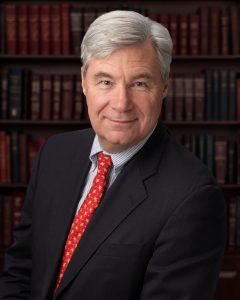Whitehouse Details How the Supreme Court’s Billionaire Gifts Program Undermines Public Corruption Cases

At the same time, there is a billionaire-funded gifts problem at the court. Sitting Supreme Court justices accept unprecedented, undisclosed gifts from mega-donors who have a demonstrated interest in influencing the court. It’s not chicken feed. Justice Antonin Scalia accepted six dozen[1] or so free hunting vacations, solicited on his behalf and undisclosed; conservatively worth half a million dollars. He was regularly accompanied on these private jaunts by political figures and people with business interests before the court.
On the present court, Justice Clarence Thomas got a private loan to buy a high-end recreational vehicle worth a quarter-million dollars.[2] He paid some interest for a while on the loan, but no principal, and the donor ultimately ceased collecting either interest or principal.
Justice Samuel Alito and Justice Thomas have jetted secretly off in private aircraft to exotic vacation destinations, on trips worth tens of thousands of dollars, accompanied by wealthy individuals who have a personal interest in outcomes of Supreme Court cases.[3]
While the full extent of the financial support to Justice Thomas’ family is not clear, private school tuition, family home rental and spousal salary all seem to have flowed in from a right-wing billionaire, Harlan Crow, and his political functionary to the Thomas family. All of this is wrong.
The extent of the billionaire gifts program is not known because the court is resisting disclosure. But, the program seems both constant and consistent: the same billionaires, the same intermediaries, the same organizations, the same gifting techniques, often with the same companions on the same trips.
To create more accountability at the court, I introduced a bill, the Supreme Court Ethics, Recusal, and Transparency Act. The bill, passed by the Senate Judiciary Committee, would improve disclosure of travel and hospitality for judges and create a process for investigating misconduct at the Supreme Court, among other reforms.
There is a lot of “quid” flowing, great gobs of “quid” that is both secretive and unprecedented. So when these justices look at “quid pro quo” and require immediacy between “quid” and “quo” — when they forbid juries from finding long-term patterns of improper influence — it is a self-serving constriction.
A governor was convicted of corruption after he received a fancy luggage set and a New York “shopping spree” for his wife, to influence his state university in issuing a contract to the donor. Overturned in McDonell v. U.S.
A construction contractor was convicted on charges related to bid-rigging when he paid government insiders for nonpublic information he used to tailor a proposal that won him a lucrative contract. Overturned in Ciminelli v. U.S.
A state government official who briefly stepped away from government service to work on a governor’s reelection campaign was convicted for using his “wide range of influence over state decision-making” to get a state contract requirement waived for a company that had paid him tens of thousands of dollars. Overturned in Percoco v. U.S.
A federal law[4] limiting the amount of money candidates can raise after an election to recoup loans they made to their own campaign — when big donors know who won and can be eager to refill the candidate’s personal coffers — was upheld for years. Now, it’s been struck down in Federal Election Commission v. Ted Cruz for Senate.
State officials were convicted for using deception to close a bridge to snarl traffic “for no reason other than political payback” — conduct the court acknowledged was an “abuse of power” and a “corrupt act.” Overturned in Kelly v. U.S.
Juries have common sense, and can sniff out corruption pretty well, but this court has disabled that jury function, drawing a bright legal line through what was once left to a jury’s common sense — and it’s a bright legal line that just happens to exclude the Supreme Court billionaire gifts program from scrutiny.
A price is paid when public corruption goes unpunished. A price is paid when complex, persistent public corruption schemes are deemed lawful. The billionaire gifts program at the Supreme Court may or may not amount to public corruption, but the amour propre of the gift-getting justices may drive them, even unconsciously, to conclude that only direct and immediate sale of a vote for a bribe, “quid pro quo,” is sanctionable.
A “kept man” arrangement — paid secretly so long as he keeps delivering the goods, but without a direct link between a specific gift and a specific vote — may well be found to be corruption by a jury. This court won’t have it.
The price of that blind spot, and its resulting destruction of public corruption enforcement, is one more area of collateral damage from the Supreme Court billionaire gifts program — and yet another reason to clean up the mess at the court.